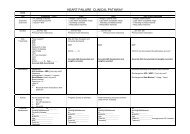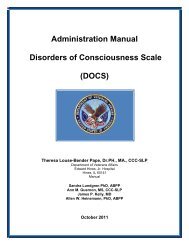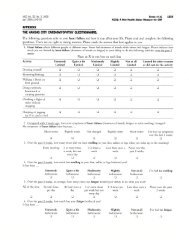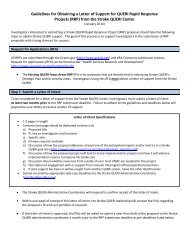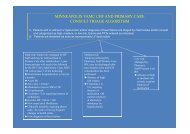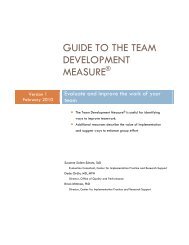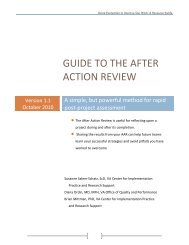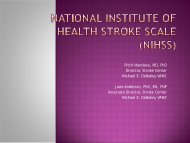The Veteran Supported Education Service Treatment Manual: VetSEd
The Veteran Supported Education Service Treatment Manual: VetSEd
The Veteran Supported Education Service Treatment Manual: VetSEd
Create successful ePaper yourself
Turn your PDF publications into a flip-book with our unique Google optimized e-Paper software.
a brain lesion<br />
TBI symptoms fall into one of three categories. <strong>The</strong>se categories include a) physical<br />
(headaches, issues with sleep, language problems, seizures, loss of sensation, weakness<br />
and others); b) cognitive (difficulties with attention, concentration, learning new material,<br />
memory, reasoning, judgment, and organization); and c) emotional/behavioral<br />
(depression, anxiety, irritability, impulsivity and aggression). Among people who have<br />
suffered a TBI, some of these symptoms improve very quickly while others take longer<br />
or, in some cases, may not fully resolve. A <strong>Veteran</strong> who has TBI may have some<br />
functional limitations that can resemble PTSD, and conversely many with PTSD may<br />
have some TBI related functional impairments. <strong>The</strong> following is a list of possible<br />
functional limitations.<br />
Functional Impairments Caused by TBI<br />
Cognitive problems such as judgment, attention, concentration, processing new<br />
information, distraction, language abilities, sequencing, short-term memory,<br />
slower thinking<br />
Perceptual problems such as hearing, vision, orientation to space and time,<br />
touch, balance and pain sensitivity<br />
Physical problems, which include; motor skills, endurance, fatigue, speech,<br />
headaches and seizures<br />
Behavioral and emotional problems such as irritability, impatience, problems<br />
with impulse control, stress, self awareness, mood swings, personality changes,<br />
reading social cues and dependence/independence<br />
Psychiatric problems that may include depression, hallucinations, paranoia and<br />
suicidal thoughts<br />
Symptoms may increase during times of fatigue and stimulus overload<br />
Decreased ability to self monitor and establish an appropriate pace of learning<br />
or working activity<br />
Persons with mild TBI may have behavior that mimic PTSD and other mental<br />
health symptoms, which can contribute to problems in obtaining appropriate<br />
services<br />
As a peer <strong>VetSEd</strong> provider, you are likely to work with some <strong>Veteran</strong>s with TBI. Some<br />
of these <strong>Veteran</strong>s will know they have TBI, as TBI is a historical diagnosis. Others might<br />
not know they have TBI, but may be experiencing some symptoms that are signs of TBI.<br />
101 | P a g e



